 Early History of California
Early History of California
Early History of San Francisco
"Ranch and Mission Days in Alta California," by
Guadalupe Vallejo
"Life in California Before the Gold Discovery," by John
Bidwell
William T. Sherman and Early Calif. History
William T. Sherman and the Gold Rush
California Gold Rush Chronology 1846 - 1849
California Gold Rush Chronology 1850 - 1851
California Gold Rush Chronology 1852 - 1854
California Gold Rush Chronology 1855 - 1856
California Gold Rush Chronology 1857 - 1861
California Gold Rush Chronology 1862 - 1865
An Eyewitness to the Gold Discovery
Military Governor Mason’s Report on the Discovery of
Gold
A Rush to the Gold Washings – From the California
Star
The Discovery – as Viewed in New York and
London
Steamer Day in the 1850s
Sam Brannan Opens New Bank - 1857
|
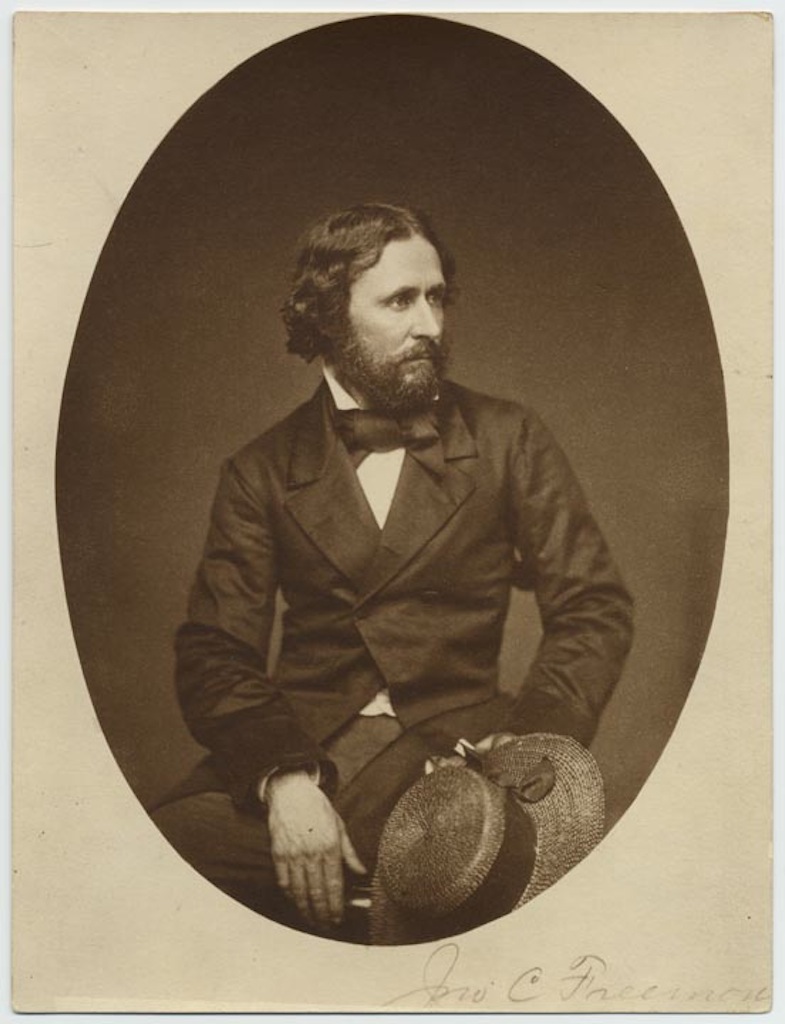 IN the autumn of 1845 Frémont came on his second exploring
expedition to California. This time he [John Frémont]
divided his party east of the Sierra Nevada and sent the greater portion to come in through a
gap supposed to exist farther to the south, while he followed substantially what is now the
emigrant road, or Truckee route, and came direct to Sutter’s Fort with about eight or nine
men. At that time I was in charge of Sutter’s Fort and of Sutter’s business, he being absent
at the bay of San Francisco. Frémont camped on the American River about three
miles above the fort. The first notice of his return to California was his sudden appearance,
with Kit Carson, at the fort. He at once made known to me his wants, namely, sixteen
mules, six pack-saddles, some flour and other provisions, and the use of a
blacksmith’s shop to shoe the mules, to enable him to go in haste to meet the others of his
party. I told him precisely what could and could not be furnished—that we had
no mules, but could let him have horses, and could make the pack-saddles; that he
might have the use of a blacksmith’s shop, but we were entirely out of coal. He became
reticent, and, saying something in a low tone to Kit Carson, rose and left without saying
good-day, and returned to his camp. As they mounted their horses to leave,
Frémont was heard to say that I was unwilling to accommodate him, which greatly
pained me; for, of course, we were always glad of the arrival of Americans, and especially
of one in authority. Besides, I knew that Captain Sutter would do anything in his power for
Frémont. So I took with me Dr. Gildea, a recent arrival from St. Louis, across the
plains, and hastened to Frémont’s camp and told him what had been reported to me.
He stated, in a very formal manner, that he was the officer of one government and Sutter
the officer of another; that difficulties existed between those governments; and hence his
inference that I, representing Sutter, was not willing to accommodate him. He reminded me
that on his first arrival here, in 1844, Sutter had sent out and in half an hour had brought
him all the mules he wanted. I protested my willingness to do anything in my power, but
was obliged to plead inability to do more than stated, telling him that in 1844 Sutter was in
far better circumstances; that on that occasion a man (Peter Lassen) had just arrived with a
hundred mules, of which Sutter had bought what Frémont needed. But he had not
been able to pay for them, because Frémont’s drafts had to go East before Sutter
could realize on them the money which had been promised to Lassen. In a few days Sutter
returned, but could not furnish anything more than I had offered. Then Frémont
concluded to go down to the bay and get supplies. He went with his little party of eight or
nine men, including Kit Carson, but without success; so he sent the men back to Sutter’s
IN the autumn of 1845 Frémont came on his second exploring
expedition to California. This time he [John Frémont]
divided his party east of the Sierra Nevada and sent the greater portion to come in through a
gap supposed to exist farther to the south, while he followed substantially what is now the
emigrant road, or Truckee route, and came direct to Sutter’s Fort with about eight or nine
men. At that time I was in charge of Sutter’s Fort and of Sutter’s business, he being absent
at the bay of San Francisco. Frémont camped on the American River about three
miles above the fort. The first notice of his return to California was his sudden appearance,
with Kit Carson, at the fort. He at once made known to me his wants, namely, sixteen
mules, six pack-saddles, some flour and other provisions, and the use of a
blacksmith’s shop to shoe the mules, to enable him to go in haste to meet the others of his
party. I told him precisely what could and could not be furnished—that we had
no mules, but could let him have horses, and could make the pack-saddles; that he
might have the use of a blacksmith’s shop, but we were entirely out of coal. He became
reticent, and, saying something in a low tone to Kit Carson, rose and left without saying
good-day, and returned to his camp. As they mounted their horses to leave,
Frémont was heard to say that I was unwilling to accommodate him, which greatly
pained me; for, of course, we were always glad of the arrival of Americans, and especially
of one in authority. Besides, I knew that Captain Sutter would do anything in his power for
Frémont. So I took with me Dr. Gildea, a recent arrival from St. Louis, across the
plains, and hastened to Frémont’s camp and told him what had been reported to me.
He stated, in a very formal manner, that he was the officer of one government and Sutter
the officer of another; that difficulties existed between those governments; and hence his
inference that I, representing Sutter, was not willing to accommodate him. He reminded me
that on his first arrival here, in 1844, Sutter had sent out and in half an hour had brought
him all the mules he wanted. I protested my willingness to do anything in my power, but
was obliged to plead inability to do more than stated, telling him that in 1844 Sutter was in
far better circumstances; that on that occasion a man (Peter Lassen) had just arrived with a
hundred mules, of which Sutter had bought what Frémont needed. But he had not
been able to pay for them, because Frémont’s drafts had to go East before Sutter
could realize on them the money which had been promised to Lassen. In a few days Sutter
returned, but could not furnish anything more than I had offered. Then Frémont
concluded to go down to the bay and get supplies. He went with his little party of eight or
nine men, including Kit Carson, but without success; so he sent the men back to Sutter’s
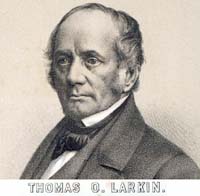 Fort to go, as best they could, to find the main party. Meanwhile he himself had made his
way Monterey to see the American consul, Thomas O. Larkin. After several weeks
Frémont and his entire party became united in the San Joaquin Valley. While at
Monterey he had obtained permission from Jose Castro, the commandant-general, to
winter in the San Joaquin Valley, away from the settlements, where the men would not be
likely to annoy the people. He had in all in the exploring party about sixty well-
armed men. He also had permission to extend his explorations in the spring as far
south as the Colorado River.
Fort to go, as best they could, to find the main party. Meanwhile he himself had made his
way Monterey to see the American consul, Thomas O. Larkin. After several weeks
Frémont and his entire party became united in the San Joaquin Valley. While at
Monterey he had obtained permission from Jose Castro, the commandant-general, to
winter in the San Joaquin Valley, away from the settlements, where the men would not be
likely to annoy the people. He had in all in the exploring party about sixty well-
armed men. He also had permission to extend his explorations in the spring as far
south as the Colorado River.
His men in the mountains had suffered considerably. Frémont had given positive
orders for them to wait at a certain gap or low divide till he should meet them with supplies,
but the place could not be found. The men got out of provisions and bought from the
Indians. The kind they most relished was a sort of brown meal, which was rich and spicy,
and came so much into favor that they wanted no other. After a while the Indians became
careless in the preparation of this wonderful meal, when it was discovered to be full of the
broken wings and legs of grasshoppers! It was simply dried grasshoppers pounded into a
meal. The men said it was rich and would stick to the mouth like gingerbread, and that they
were becoming sleek and fat. But after the discovery they lost their appetites. How hard it
is sometimes to overcome prejudice!
Accordingly, early in the spring (1846) Frémont started south with his party.
When Castro gave him permission to explore towards the Colorado River he no doubt
supposed he would go south or southeast from where he was camped in the San Joaquin
Valley, and on through the Tejon Pass and the Mojave Desert; but, instead,
Frémont with his sixty armed men started to go west and southwest through the
most thickly settled parts of California, namely, the Santa Clara, Pajaro, and Salinas
Valleys. As he was approaching the last valley, Castro sent an official order by an officer
warning Frémont that he must leave, as his action was illegal. The order was
delivered March 5th. Frémont took possession of an eminence called Gavilan Peak,
and continued to fortify himself for several days, perhaps a week or more, Castro
meantime remaining in sight and evidently increasing his force day by day.
Frémont, enraged against Castro, finally abandoned his position in the night of
March 9th, and, gaining the San Joaquin Valley, made his way rapidly northward up the
Sacramento Valley and into Oregon, leaving Sutter’s about March 24th.
A little over four weeks after Frémont left I happened to be fishing four or five
miles down the river, having then left Sutter’s service with the view of trying to put up two
or three hundred barrels of salmon, thinking the venture would be profitable. An officer of
the United States, Lieutenant A. H. Gillespie, of the marines, bearing messages to the
explorer, came up the river in a small boat and at once inquired about Frémont. I
told him he had gone to Oregon. Said he: “I want to overhaul him. How far is it to the
fort?” And receiving my reply, he pushed rapidly on. He overtook Frémont near the
Oregon line. Frémont, still indignant against Castro, who had compelled him to
abandon his explorations south, returned at once to California. It so happened that Castro
had sent Lieutenant Arce to the north side of the bay of San Francisco to collect scattered
Government horses. Arce had secured about one hundred and fifty and was taking them to
the south side of the bay, via Sutter’s Fort and the San Joaquin Valley. This was the only
way to transfer cattle and horses from one side of the bay to the other, except at the Straits
of Carquinez by the slow processes of swimming one at a time, or of taking one or two,
tied by all four feet, in a small boat or launch. Arce, with the horses and seven or eight
soldiers, arrived at Sutter’s Fort, staid overnight as the guest of Sutter, and went on his
way to the Cosumnes River (about sixteen or eighteen miles) and camped for the night.
Frémont’s hasty departure for Oregon and Gillespie’s pursuit of him had been
the occasion of many surmises. Frémont’s sudden return excited increased
curiosity. People flocked to his camp; some were settlers, some hunters; some were good
men, and some about as rough specimens of humanity as it would be possible to find
anywhere. Frémont, hearing that the horses were passing, sent a party of these
promiscuous people and captured them. This, of course, was done before he had orders or
any positive news that war had been declared. When Gillespie left the United States, as the
bearer of a despatch to Larkin and Frémont and of letters to the latter, war had not
been declared. The letters included one from Senator Benton, who had the confidence and
knew the purposes of the Administration. As Gillespie had to make his way through
Mexico, he committed the despatch and his orders to memory, destroyed them, and rewrote
them on the vessel which took him, via the Sandwich Islands, to the coast of California.
There had been no later arrival, and therefore no later despatches to Frémont were
possible. Though Frémont was reticent, whatever he did was supposed to be done
with the sanction of the United States. Thus, without giving the least notice even to Sutter,
the great friend of Americans, or to Americans in general, scattered and exposed as they
were all over California, he precipitated the war.
Sutter was always outspoken in his wish that some day California should belong to the
United States; but when he heard that the horses had been taken from Arce (who made no
resistance, but with his men and with insulting messages was permitted to go on his way to
Castro at Santa Clara), he expressed surprise that Captain Frémont had committed
such an act without his knowledge. What Sutter had said was reported to Frémont,
perhaps with some exaggeration.
As soon as the horses arrived at Frémont’s camp, the same
party—about twenty-five in number—were sent to Sonoma.
By this party General Vallejo, the most prominent Californian north of the bay, his brother
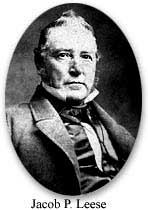 Salvador, his brother-in-law Jacob P. Leese, and Victor Prudon were
surprised at night, taken prisoners, and conveyed to Frémont’s camp, over eighty
miles distant by the traveled route on the Sacramento River. The prisoners were sent to
Sutter’s Fort, Frémont arriving at the same time. Then Sutter and Frémont
met, face to face, for the first time since Frémont, a month before, had passed on
his way towards Oregon. I do not know what words passed between them; I was near, but
did not hear. This, however, I know: that Sutter had become elated, as all Americans were,
with the idea that what Frémont was doing meant California for the United States,
But in a few minutes Sutter came to me greatly excited, with tears in his eyes, and said that
Frémont had told him he was a Mexican, and that if he did not like what he
(Frémont) was doing he would set him across the San Joaquin River and he could
go and join the Mexicans. But, this flurry over, Sutter was soon himself again, and
resumed his normal attitude of friendship towards Frémont, because he thought him
to be acting in accordance with instructions from Washington. For want of a suitable
prison, the prisoners were placed in Sutter’s parlor,—a large room in the
southwest corner of the second story of the two-story adobe
house,—which had but one door, and this was now guarded by a sentinel.
Frémont gave me special directions about the safety of the prisoners, and I
understood him to put them under my special charge. Some of Frémont’s men
remained at the fort. This adobe house is still standing, within the limits of the city of
Sacramento, and is the only relic left of Sutter’s Fort. It was built in 1841—the
first then, the last now.
Salvador, his brother-in-law Jacob P. Leese, and Victor Prudon were
surprised at night, taken prisoners, and conveyed to Frémont’s camp, over eighty
miles distant by the traveled route on the Sacramento River. The prisoners were sent to
Sutter’s Fort, Frémont arriving at the same time. Then Sutter and Frémont
met, face to face, for the first time since Frémont, a month before, had passed on
his way towards Oregon. I do not know what words passed between them; I was near, but
did not hear. This, however, I know: that Sutter had become elated, as all Americans were,
with the idea that what Frémont was doing meant California for the United States,
But in a few minutes Sutter came to me greatly excited, with tears in his eyes, and said that
Frémont had told him he was a Mexican, and that if he did not like what he
(Frémont) was doing he would set him across the San Joaquin River and he could
go and join the Mexicans. But, this flurry over, Sutter was soon himself again, and
resumed his normal attitude of friendship towards Frémont, because he thought him
to be acting in accordance with instructions from Washington. For want of a suitable
prison, the prisoners were placed in Sutter’s parlor,—a large room in the
southwest corner of the second story of the two-story adobe
house,—which had but one door, and this was now guarded by a sentinel.
Frémont gave me special directions about the safety of the prisoners, and I
understood him to put them under my special charge. Some of Frémont’s men
remained at the fort. This adobe house is still standing, within the limits of the city of
Sacramento, and is the only relic left of Sutter’s Fort. It was built in 1841—the
first then, the last now.
Among the men who remained to hold Sonoma was William B. Ide, who assumed to
be in command. In some way (perhaps through an unsatisfactory interview with
Frémont which he had before the move on Sonoma), Ide got the notion that
Frémont’s hand in these events was uncertain, and that Americans ought to strike
for an independent republic. To this end nearly every day he wrote something in the form
of a proclamation and posted it on the old Mexican flagstaff.
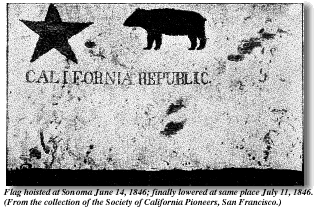 Another man left at Sonoma
was William L. Todd who painted, on a piece of brown cotton, a yard and a half or so in
length, with old red or brown paint that he happened to find, what he intended to be a
representation of a grizzly bear. This was raised to the top of the staff, some seventy feet
from the ground. Native Californians looking up at it were heard to say “Coche,” the
common name among them for pig or shoat. More than thirty years afterwards I chanced to
meet Todd on the train coming up the Sacramento Valley. He had not greatly changed, but
appeared considerably broken in health. He informed me that Mrs. Lincoln was his own
aunt, and that he had been brought up in the family of Abraham Lincoln.
Another man left at Sonoma
was William L. Todd who painted, on a piece of brown cotton, a yard and a half or so in
length, with old red or brown paint that he happened to find, what he intended to be a
representation of a grizzly bear. This was raised to the top of the staff, some seventy feet
from the ground. Native Californians looking up at it were heard to say “Coche,” the
common name among them for pig or shoat. More than thirty years afterwards I chanced to
meet Todd on the train coming up the Sacramento Valley. He had not greatly changed, but
appeared considerably broken in health. He informed me that Mrs. Lincoln was his own
aunt, and that he had been brought up in the family of Abraham Lincoln.
The party at Sonoma now received some accessions from Americans and other
foreigners living on the north side of the bay. Rumors began to reach them of an uprising
on the part of the native Californians, which indeed began under Joaquin de la Torre.
Henry L. Ford and other Americans to the number of thirty met De la
Torre—whose force was said to number from forty to
eighty—near the Petaluma Ranch, and four or five of the Californians were
said to have been killed or wounded. The repulse of the Californians seems to have been
complete, though reports continued alarming, and a man sent from Sonoma to Russian
River for powder was killed. A messenger was sent in haste to Sacramento for
Frémont, who hurried to Sonoma with nearly all his exploring party and scoured
the country far and near, but found no enemy.
I tried to make the prisoners at Sacramento as comfortable as possible, assisting to see
that their meals were regularly and properly brought, and sometimes I would sit by while
they were eating. One day E. M. Kern, artist to Frémont’s exploring expedition,
called me out and said it was Frémont’s orders that no one was to go in or speak to
the prisoners.
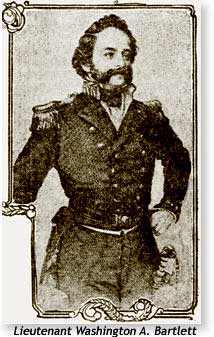 I told him they were in my charge, and that he had nothing to say about
them. He asserted that they were in his charge, and finally convinced me that he had been
made an equal, if not the principal, custodian. I then told him that, as both of us were not
needed, I would go over and join Frémont at Sonoma. Just at this time Lieutenant
Washington A. Bartlett of the United States Navy arrived from the bay, inquiring for
Frémont. The taking of the horses from Arce, the capture of the prisoners, and the
occupation of Sonoma, had been heard of, and he was sent to learn what it meant. So he
went over to Sonoma with me.
I told him they were in my charge, and that he had nothing to say about
them. He asserted that they were in his charge, and finally convinced me that he had been
made an equal, if not the principal, custodian. I then told him that, as both of us were not
needed, I would go over and join Frémont at Sonoma. Just at this time Lieutenant
Washington A. Bartlett of the United States Navy arrived from the bay, inquiring for
Frémont. The taking of the horses from Arce, the capture of the prisoners, and the
occupation of Sonoma, had been heard of, and he was sent to learn what it meant. So he
went over to Sonoma with me.
On our arrival Frémont was still absent trying to find the enemy, but that
evening he returned. The Bear Flag was still flying, and had been for a week or more. The
American flag was nowhere displayed. There was much doubt about the situation.
Frémont gave us to understand that we must organize. Lieutenant Gillespie seemed
to be his confidential adviser and spokesman, and said that a meeting would be held the
next day at which Frémont would make an address. He also said that it would be
necessary to have some plan of organization ready to report to the meeting; and that P. B.
Reading, W. B. Ide. and myself were requested to act as a committee to report such a plan.
We could learn nothing from Frémont or Gillespie to the effect that the United
States had anything to do with Frémont’s present movements.
In past years rumors of threats against Americans in California had been rather
frequent, several times causing them and other foreigners to hasten in the night from all
places within one or two hundred miles to Sutter’s Fort, sometimes remaining a week or
two, drilling and preparing to resist attack. The first scare of this kind occurred in 1841,
when Sutter became somewhat alarmed: the last, in 1845. But in every case such rumors
had proved to be groundless, so that Americans had ceased to have apprehensions,
especially in the presence of such an accessible refuge as Sutter’s Fort. And now, in 1846,
after so many accessions by immigration, we felt entirely secure, even without the presence
of a United States officer and his exploring force of sixty men, until we found ourselves
suddenly plunged into a war. But hostilities having been begun, bringing danger where
none before existed, it now became imperative to organize. It was in everyone’s mouth
(and I think must have come from Frémont) that the war was begun in defense of
American settlers! This was simply a pretense to justify the premature beginning of the
war, which henceforth was to be carried on in the name of the United States.
So much has been said and written about the “Bear Flag” that some may conclude it was
something of importance. It was not so regarded at the time: it was never adopted at any
meeting or by any agreement; it was, I think, never even noticed, perhaps never seen, by
Frémont when it was flying. The naked old Mexican flagstaff at Sonoma suggested
that something should be put on it. Todd had painted it, and others had helped to put it up,
for mere pastime. It had no importance to begin with, none whatever when the Stars and
Stripes went up, and never would have been thought of again had not an officer of the navy
seen it in Sonoma and written a letter about it.
Under these circumstances on the Fourth of July our committee met. We soon found
that we could not agree. Ide wished to paste together his long proclamations on the
flagstaff, and make them our report. Reading wrote something much shorter, which I
thought still too long. I proposed for our report simply this: “The undersigned hereby agree
to organize for the purpose of gaining and maintaining the independence of California.”
Unable to agree upon a report, we decided to submit what we had written to Lieutenant
Gillespie, without our names, and ask him to choose. He chose mine. The meeting took
place, but Frémont’s remarks gave us no light upon any phase of the situation. He
neither averred nor denied that he was acting under orders from the United States
Government. Some men had been guilty of misconduct in an Indian village, and he
reprimanded them—said he wanted nothing to do with the movement unless
the men would conduct themselves properly. Gillespie made some remarks, presented the
report, and all present signed it.
The organization took place forthwith, by the formation of three companies. The
captains elected were Henry L. Ford, Granville P. Swift, and Samuel J. Hensley. Thus
organized, we marched into the Sacramento Valley. The men who had not been at Sonoma
signed the report at the camp above Sutter’s Fort, except a few who soon after signed it at
the Mokelumne River on our march to Monterey. This was, so far as I know, the last seen
or heard of that document, for Commodore Sloat had raised the American flag at Monterey
before our arrival, and soon it waved in all places in California where American influence
prevailed.
As yet Frémont had received advices from Washington no later than those
brought by Gillespie. His object in going to Monterey must have been to confer with
Commodore Sloat and get positive information about the war with Mexico, which proved
to be a reality, as we learned even before our arrival there. There was now no longer
uncertainty; all were glad. It was a glorious sight to see the Stars and Stripes as we
marched into Monterey. Here we found Commodore Sloat. The same evening, or the next,
Commodore Stockton, a chivalrous and dashing officer, arrived around Cape Horn to
supersede him. Plans were immediately laid to conquer California. A California Battalion
was to be organized, and Frémont was to be lieutenant-colonel in command.
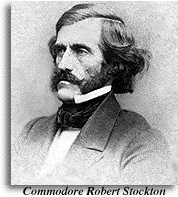 Stockton asked Frémont to
nominate his own officers. P. B. Reading was chosen paymaster, Ezekiel Merritt
quartermaster, and, I think, King commissary. The captains and lieutenants chosen at
Sonoma were also commissioned. Though I did not aspire to office, I received a
commission as second lieutenant.
Stockton asked Frémont to
nominate his own officers. P. B. Reading was chosen paymaster, Ezekiel Merritt
quartermaster, and, I think, King commissary. The captains and lieutenants chosen at
Sonoma were also commissioned. Though I did not aspire to office, I received a
commission as second lieutenant.
Merritt, the quartermaster, could neither read nor write. He was an old mountaineer
and trapper, lived with an Indian squaw, and went clad in buckskin fringed after the style
of the Rocky Mountain Indians. He chewed tobacco to a disgusting excess, and stammered
badly. He had a reputation for bravery because of his continual boasting of his prowess in
killing Indians. The handle of the tomahawk he carried had nearly a hundred notches to
record the number of his Indian scalps. He drank deeply whenever he could get liquor.
Stockton said to him: “Major Merritt” (for he was now major), “make out a requisition for
some money, say two thousand dollars. You will need about that amount at the start. Bring
your requisition on board, and I will approve, and direct the purser to honor it.” Major
Reading wrote the requisition and Merritt got the money, two thousand Mexican silver
dollars. That afternoon I met him in Monterey, nearly as drunk as he could be. He said:
“Bidwell, I am rich; I have lots of money”; and putting both hands into the deep pockets of
his buckskin breeches he brought out two handfuls of Mexican dollars, saying, “Here, take
this, and if you can find anything to buy, buy it, and when you want more money come to
me, for I have got lots of it.”
Merritt was never removed from his office or rank, but simply fell into disuse, and
was detailed, like subordinate officers or men, to perform other duties, generally at the
head of small scouting parties. Merritt’s friends–for he must have had friends
to recommend him for quartermaster–in some way managed to fix up the
accounts relating to the early administration of his office. In fact, I tried to help them
myself, but I believe that all of us together were never able to find, within a thousand
dollars, what Merritt had done with the money. How he ever came to be recommended for
quartermaster was to every one a mystery. Perhaps some of the current theories that
subsequently prevailed might have had in them just a shade of truth, namely, that
somebody entertained the idea that quartermaster meant the ability and duty to quarter the
beef!
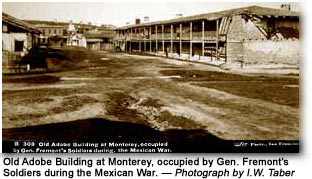 The first conquest of California, in 1846, by the Americans, with the exception of the
skirmish at Petaluma and another towards Monterey, was achieved without a battle. We
simply marched all over California, from Sonoma to San Diego, and raised the American
flag without opposition or protest. We tried to find an enemy, but could not. So Kit Carson
and Ned Beale were sent East, bearing despatches from Commodore Stockton announcing
the entire conquest of California by the United States. Frémont was made Governor
by Stockton at Los Angeles, but could not enter upon the full discharge of the duties of his
office till he had visited the upper part of California and returned. He sent me to take charge
of the Mission of San Luis Rey, with a commission as magistrate over the larger portion of
the country between Los Angeles and San Diego. Stockton and all his forces retired on
board of their vessels. Frémont went north, leaving part of his men at Los Angeles
under Gillespie, part at Santa Barbara under Lieutenant Talbot, and some at other points.
Pio Pico and José Castro, respectively the last Mexican governor and commander-
in-chief, remained concealed a while and then withdrew into Mexico.
The first conquest of California, in 1846, by the Americans, with the exception of the
skirmish at Petaluma and another towards Monterey, was achieved without a battle. We
simply marched all over California, from Sonoma to San Diego, and raised the American
flag without opposition or protest. We tried to find an enemy, but could not. So Kit Carson
and Ned Beale were sent East, bearing despatches from Commodore Stockton announcing
the entire conquest of California by the United States. Frémont was made Governor
by Stockton at Los Angeles, but could not enter upon the full discharge of the duties of his
office till he had visited the upper part of California and returned. He sent me to take charge
of the Mission of San Luis Rey, with a commission as magistrate over the larger portion of
the country between Los Angeles and San Diego. Stockton and all his forces retired on
board of their vessels. Frémont went north, leaving part of his men at Los Angeles
under Gillespie, part at Santa Barbara under Lieutenant Talbot, and some at other points.
Pio Pico and José Castro, respectively the last Mexican governor and commander-
in-chief, remained concealed a while and then withdrew into Mexico.
Suddenly, in about a month, Frémont being in the north and his troops
scattered, the whole country south of Monterey was in a state of revolt
Then for the first time there was something like war. As there were rumors of Mexican
troops coming from Sonora, Merritt was sent by Gillespie to reconnoiter towards the
Colorado River. Gillespie was surrounded at Los Angeles, and made to capitulate. I fled
from San Luis Rey to San Diego. Merritt and his party, hearing of the outbreak, also
escaped to San Diego. Meanwhile, Frémont enlisted a considerable force (about
four hundred), principally from the large Hastings immigration at Sacramento, and
marched south. Commodore Stockton had landed and marched to retake Los Angeles, and
failed. All the men-of-war, and all the scattered forces, except
Frémont’s new force, were then concentrated at San Diego, where Commodore
Stockton collected and reorganized the forces, composed of sailors, marines, men of
Frémont’s battalion under Gillespie and Merritt, volunteers at San Diego, including
some native Californians and that portion of the regular troops under
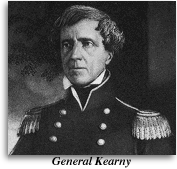 General S. W. Kearny that had escaped from the field of San Pascual
–in all between 700 and 800 men. Of these forces I was commissioned and
served as quartermaster. This work of preparation took several months. Finally, on the
29th of December, 1846, the army set out to retake Los Angeles. It fought the battles of
San Gabriel and the Mesa, which ended the insurrection. The enemy fled, met
Frémont at San Fernando, and surrendered to him the next day. The terms of
surrender were so lenient that the native Californians from that time forth became the fast
friends of Frémont.
General S. W. Kearny that had escaped from the field of San Pascual
–in all between 700 and 800 men. Of these forces I was commissioned and
served as quartermaster. This work of preparation took several months. Finally, on the
29th of December, 1846, the army set out to retake Los Angeles. It fought the battles of
San Gabriel and the Mesa, which ended the insurrection. The enemy fled, met
Frémont at San Fernando, and surrendered to him the next day. The terms of
surrender were so lenient that the native Californians from that time forth became the fast
friends of Frémont.
Time does not permit me to do more than allude to the arrival at San Diego of General
Kearny with one hundred soldiers, and with Kit Carson and Beale, from New Mexico; or
to his repulse at San Pascual.
Unfortunate differences regarding rank had arisen between Stockton and Kearny.
Frémont was afterwards arrested in California by Kearny for refusing to obey his
orders, and was taken to Washington and court-martialed. Stockton, however, was
largely to blame. He would not submit to General Kearny, his superior in command on
land, and that led Frémont to refuse to obey Kearny, his superior officer.
Frémont’s disobedience was no doubt owing to the advice of Stockton who had
appointed him governor of California
The war being over, nearly all the volunteers were discharged from the service in
February and March, 1847, at Los Angeles and San Diego. Most of us made our way up
the coast by land to our homes. I had eleven horses, which I swam, one at a time, across
the Straits of Carquinez at Benicia, which J. M. Hudspeth, the surveyor, was at the time
laying out for Dr. Robert Semple, and which was then called “Francisca” after Mrs.
Vallejo, whose maiden name was Francisca Benicia Carrillo.
JOHN BIDWELL.
The Century Illustrated Monthly Magazine,
February, 1891, vol. XLI, no. 4
Return to the top of the page.
|